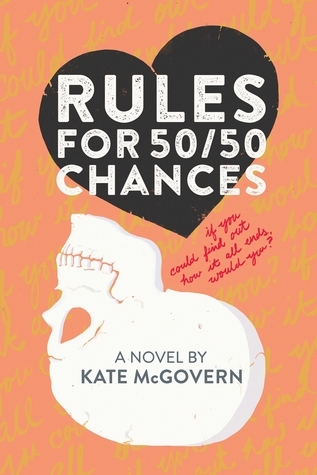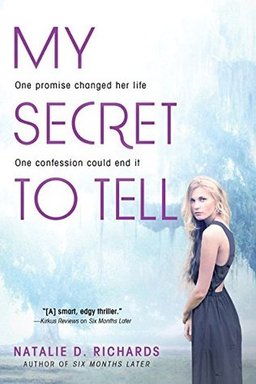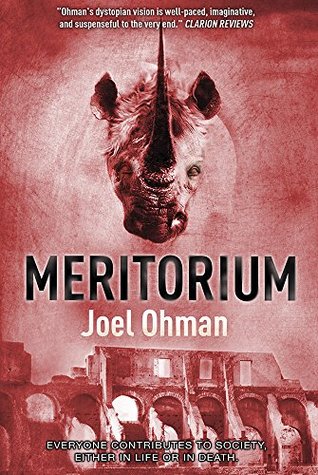Monthly Archives: November 2015
Rules for 50/50 Chances
 Rules for 50/50 Chances
Rules for 50/50 Chances
Macmillan Children's Publishing Group
November 24, 2015
Hardcover
352

Seventeen-year-old Rose Levenson has a decision to make: Does she want to know how she's going to die? Because when Rose turns eighteen, she can take the test that tells her if she carries the genetic mutation for Huntington's disease, the degenerative condition that is slowly killing her mother.
With a fifty-fifty shot at inheriting her family's genetic curse, Rose is skeptical about pursuing anything that presumes she'll live to be a healthy adult-including her dream career in ballet and the possibility of falling in love. But when she meets a boy from a similarly flawed genetic pool and gets an audition for a dance scholarship across the country, Rose begins to question her carefully laid rules.
Review:
I don’t think I’ve ever been as conflicted about a book as I am about “Rules for 50/50 Chances”. It is a solid 3 1/2 but can’t be rounded up to a 4.
The protagonist, Rose, is a ballerina with a mother who is suffering with Huntington’s disease. While I don’t know anyone with Huntington’s and therefore not speaking from experience, I believe the author did a good job of conveying the challenges and emotions it presents to an average family. One of the strongest points of the book is how well-developed the family dynamics are, with each member of the family seeming so real it’s like you know them. I especially enjoyed the family trait of being train buffs, which ultimately led to the reasons why trains are awesome. (Spoiler alert: Trains really are awesome.)
There is also quite a bit of diversity in the book. Caleb, the main male character, is african-american, while Rose’s best friend, Lena, is asian-american. Rose herself is part Jewish. The differences in culture, as well as the differences in the diseases that run in their families, are explored and not ignored as some books tend to do.
That being said, I had two major issues when reading this book. The first is that Rose and Caleb are both somewhat unlikable and judgmental toward each other. In fact, Rose is generally unlikable in almost all of her interactions. While some of it is pointed out, so obviously done purposefully, her irritation level went off the charts for me. Also, I cannot see those two ever developing an actual healthy relationship. The second problem is that it was just too long. Some of it could have been cut and the plot would have run quite a bit more smoothly. As it was I found myself having to force myself to keep reading some parts.
“Rules for 50/50 Chances” is by no means a bad book, and it brings up many important issues and diseases. It’s a good contemporary read for both young and old adults who have a bit of patience for the slow parts and the character flaws.
This unbiased review is based upon a complimentary copy provided by the publisher.
Content Warning:
Language, Sexual Situations
My Secret to Tell
 My Secret to Tell
My Secret to Tell
Sourcebooks Fire
October 6, 2015
Paperback
320

His smile is a crime.
Emerson May is "the good girl." She's the perfect daughter, the caring friend, the animal shelter volunteer. But when her best friend's brother breaks into her room, his hands covered in blood, she doesn't scream or call the cops. Because when Deacon smiles at her, Emmie doesn't want to be good...
The whole town believes notorious troublemaker Deacon is guilty of assaulting his father. Only Emmie knows a secret that could set him free. But if she follows her heart, she could be trusting a killer...
You can't always trust the boy next door.
Review:
“My Secret to Tell” is a combination of mystery and “bad boy” romance which is blissfully free of love triangles.
The characters of Emmie and Deacon were a lot of fun to read. Their banter felt natural and not at all forced. They also did not suffer from instalove, and I appreciate that fact quite a bit. Emmie faces many of the problems that most young adults face, including parental expectations versus personal wants. Deacon has quite a few problems, but many of the problems have a good cause. What I particularly liked was that none of the problems, good reason or not, are actually excused as appropriate behavior. That includes from Emmie. How often does unblinded love happen in a young adult romance? Not enough.
The plot was fun, though I did figure out a good bit of the twist before it was revealed at the end. That’s the reason I gave it four stars instead of five. It’s a quick read. While not completely light, it also isn’t too heavy, so it’s a nice book to take on a vacation or read during downtime. I’d also like to mention that the descriptions of the North Carolina coast are beautiful and completely accurate. If you have a love of the area, you will enjoy it for that alone.
I recommend “My Secret to Tell” for young adults and adults alike who are looking for an enjoyable read.
This review is based upon a complimentary copy provided by the publisher in exchange for an honest review.
Content Warning:
Language, Sexual Situations, Violence, Mentions of Drug Use
Need
 Need
Need
HMH Books for Young Readers
November 3, 2015
Hardcover
352

“No one gets something for nothing. We all should know better.”
Teenagers at Wisconsin’s Nottawa High School are drawn deeper into a social networking site that promises to grant their every need . . . regardless of the consequences. Soon the site turns sinister, with simple pranks escalating to malicious crimes. The body count rises. In this chilling YA thriller, the author of the best-selling Testing trilogy examines not only the dark side of social media, but the dark side of human nature.
Review:
It takes quite a bit to scare me as far as books are concerned, but “Need” had me wishing I had left the lights on when I went to bed. It’s a solid new book from the author of the popular “Testing” series that fans of thrillers or the author will not want to miss.
The story is told through the first person with Kaylee and through the third person using various students who are members of the new social networking site “Need.” Need promises to deliver what those who make requests need (though it’s really wants), but at a price. Mixing the points of view makes for a great mystery that gives the readers enough clues to keep it interesting, but not so many that it’s obvious what is going on.
All of the characters are compelling, even those with only a few pages in total devoted to them. The plot makes for a page-turner and never slows down. It also brings up many serious issues about social networking and human nature, both good and bad. In fact, aside from a few events that seem a bit of a stretch of reality, I can’t find anything that I didn’t like about “Need”. Also, there is one instance of animal abuse and death, though it isn’t gratuitous and is important to the plot, so please beware if that triggers you.
I recommend “Need” to all of those old (and brave) enough to handle a book that is terrifying because it could actually happen. It can be used to spark discussion about dangers, both online and off, as well as how we treat others.
This review is based upon a complimentary copy of the book provided by the publisher in exchange for an honest review.
Content Warning:
Language, Sexual Situations, Violence, Animal Abuse
Meritorium
 Meritorium
Meritorium
Meritroplois, Book 2
CreateSpace Independent Publishing Platform
September 28, 2015
Paperback
262

Under the System everyone is assigned a numerical Score that decides their worth to society and whether they live or die.
Charley has escaped from Meritropolis...
but in his quest to take down the System that has taken his brother from him, he must go through Meritorium, a city where gladiatorial games of life or death combat are waged between High Scores and Low Scores, man and beast.
Charley and Sandy must face man-eating plants, religious zealots, slave traders, and the ever present mutant animal combinations that roam a dystopian Coliseum presided over by Emperor Titus, the one man standing between Charley and the answers he seeks. Man is not an animal, but if they are to make it through Meritorium, will they even be able to tell the difference?
The lines between man and beast, friend and foe, will blur in Meritorium, the riveting sequel to the bestselling Meritropolis.
Review:
“Meritorium” is the second book in the Meritropolis series. The debut book, “Meritropolis”, introduced a unique and well-developed world, along with an interesting cast of characters. Unfortunately, “Meritorium” did not live up to the original.
The characters and plot are still interesting, which is what frustrated me the most about the problems in the book. There was quite a bit of “over-explaining”, which did nothing but slow down the flow of the plot and cause me to grow impatient with it. Additionally, there were some interesting religious themes, but instead of letting the story carry them, they were also explained in too great of detail. It reduced the impact and made it read like a sermon, whereas subtlety would have given much more for the reader to ponder.
“Meritorium” had a lot of potential, but I can’t recommend it because of the reasons above. I’m still looking forward to the next in the series, as I have high hopes it will return to the writing style the made “Meritropolis” so good.
This review is based upon a complimentary copy provided by the publisher in exchange for an honest review.
Content Warning:
Violence, Gore, Animal Abuse, Child Abuse


